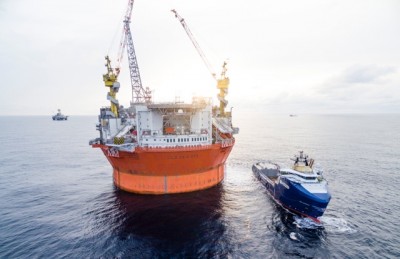Norway could finally carry out the ceremonial opening of its first oil field in the Barents Sea this week. The long-overdue Goliat oil field project has begun pumping up Arctic oil, just after Finance Minister Siv Jensen had to make another withdrawal from Norway’s oil fund, the state pension fund that’s been fueled over the past 20 years by oil revenues.

The Goliat opening, still hotly contested by environmental organizations and those worried about climate change, likely came as good news to Jensen. She needs more oil revenues to help balance the state budget.
Newspaper Dagens Næringsliv (DN) reported on Tuesday how the lower oil prices that are forcing major cutbacks in Norway’s important oil, offshore and shipping industries also mean the state isn’t getting enough excess oil revenues that can be deposited into the oil fund. All revenues flowing in now remain in the treasury, to meet current budget obligations.
Jensen also has landed, for the second time this year, in the unaccustomed position of having to withdraw from the fund, in order to cover what otherwise would be a budget deficit.
Jensen withdrew NOK 6.7 billion from the fund in January, marking the first time ever that the fund had been tapped. She made another withdrawal in February, leaving the fund with accumulated withdrawals of NOK 13.4 billion by the end of February. (Editor’s note: DN had initially reported accumulated withdrawals of more than NOK 20 billion, but that was not correct.)
The money is being pulled from the fund’s ongoing interest and dividend income, along with income from the fund’s real estate investments. That means the fund’s capital isn’t being tapped, rather its earnings, and a relatively small portion of that as well. The oil fund’s annual report for 2015 showed nearly NOK 190 billion in such earnings, which have been hit by forced sales (for ethical reasons) of shareholdings in tobacco companies, certain weapons producers and companies that have seriously harmed the environment, been guilty of serious corruption and violated human rights. The fund has at the same time avoided some potentially big losses by selling out of coal companies, 52 to date.
‘Milestone’ in the Barents
More oil gushing up from under the Arctic seabed can only help fund Jensen’s budget needs, and her Progress Party colleague, Oil Minister Tord Lien, was predictably bullish as he joyfully took part in opening ceremonies for the Goliat field on Monday. The field actually started production last month, a milestone that the mayor of Hammerfest, where Goliat’s land-based operations are located, said brought tears to his eyes.
“I’ve had three milestones in my life,” Mayor Alf E Jakobsen claimed while breathing in the smell of oil at the field located 85 kilometers northwest of his city. “When I got married, when the gas from the (the) Snøhvit (field) came to Hammerfest and when Goliat opened.” Jakobsen and many other officials in Northern Norway view oil as a major source of jobs and economic development, even though others see it as an environmental hazard that will accelerate climate change.

Lien also is a big promoter of the oil and gas business, and said he still believes the Goliat opening marks just the start of a new oil age in Norway’s Arctic areas, despite the low oil prices that are hindering new investment at present.
“The fact that we’re now not only producing gas from a large field (Snøhvit) but also from an oil field (Goliat), and doing it in a safe and secure manner, means a lot for development in the decades ahead, and in this part of the country,” Lien declared.
Goliat is the world’s northernmost offshore oil field, and the pioneering project has been challenged both technological and financially. The project was delayed by two years and subjected to budget overruns of more than 50 percent after total costs swelled from NOK 32 billion to NOK 49 billion. Italian oil company Eni owns 65 percent of its operating license, with the other 35 percent held by Norway’s Statoil. The project does not bring the oil to land, pumping and storing it offshore instead, but Eni has established offices in Hammerfest and launched new cooperation with the local fishing industry regarding oil spill prevention.
‘Fantastic platform’ after problems ‘solved’
“This project has had a string of challenges, which have been solved,” Lien claimed. “Both Eni, Statoil and state authorities have learned a lot from this project. What we’re celebrating here is an important milestone for the entire Norwegian oil industry. Now we’re producing oil in the Barents on a fantastic platform. It’s important to show that we can do that in a secure manner.”
Italy’s ambassador to Norway, Giorgio Novello, also attended the festivities at sea, held during a spell of unusually good weather. Eni’s chief executive in Norway, Ruggero Gheller, was on hand as well and noted how the company sees potential for finding more oil resources around the Goliat field. A drilling rig could be seen on the horizon, and Lien’s ministry has reported strong interest in licenses out to bid for new fields in the Barents.
They won’t go unchallenged, though. Environmental and climate advocates from Bellona to Greenpeace and Friends of the Earth firmly oppose more oil and gas activity in the sensitive Arctic and not least off the coast of Lofoten and Vesterålen. Fishing industry organizations were also fighting off a new effort this week to prospects for oil exploration off Lofoten, claiming there is no room for both the oil and fishing industry in the area’s waters that are rich with seafood.
newsinenglish.no/Nina Berglund

